Instantiation Read online
Page 7
“We could keep making the superconductor here,” Latifa suggested.
“And get it to Kandahar how?” her grandfather protested. “Do you think we can do business with anyone working that route and expect Ezatullah not to hear about it? Once or twice, maybe, but not if we set up a regular shipment.”
Latifa had no answer to that. “We should talk about this in the morning,” she said. “You’ve been working all day; you should get some sleep now.”
At her insistence he retired to the factory’s office, where they’d put in a mattress and blankets. Latifa stood by the hopper; the last batch of superconductor should have cooled by now, but she was too dejected to attend to it. If they moved the whole operation to Kandahar, the best they could hope for was scraping through without ending up in debt. She didn’t doubt that Fashard and her other cousins would do whatever needed to be done – working unpaid, purely for the sake of keeping her grandfather out of trouble – but the prospect of forcing that burden onto them filled her with shame.
Her own dawdling wasn’t helping anyone. She put on the heat-proof gloves, took the molds from the kiln and began filling the hopper. She’d once calculated that if Iran’s entire grid were to be replaced with a superconducting version, the power no longer being lost in transmission would be enough to light up all of Afghanistan. But if that was just a fantasy, all her other plans were heading for the same fate.
Latifa switched on the winders and watched the strands of wire shuttling from spool to spool, wrapping the stream of pellets from the hopper. Of all the wondrous things the superconductor made possible, this had seemed the simplest – and the safest way to exploit it without attracting too much attention.
But these dull gray beads were all she had. If she wanted to rescue the whole misbegotten venture, she needed to find another way to turn them to her advantage.
#
Latifa’s grandfather ran from the office, barefoot, eyes wide with fear. “What happened? Are you hurt?”
Latifa could see dents in the ceiling where the pellets had struck. “I’m all right,” she assured him. “I’m sorry, I didn’t mean to wake you.” She looked around; the kilns and the winders were untouched, and there was no damage to the building that a plasterer couldn’t fix.
“What did you do? I thought something exploded – or those machines went crazy.” He glared at the winders, as if they might have rebelled and started pelting their owners with shrapnel.
Latifa switched off the power from the outlet and approached what remained of her test rig. She’d surrounded it with workbenches turned on their sides, as safety shields. “I’m going to need better reinforcement,” she said. “I didn’t realize the field would get so strong, so quickly.”
Her grandfather stared at the shattered assembly that she’d improvised from a helix of copper pipe. The previous tenants had left all kinds of junk behind, and Latifa had been loath to discard anything that might have turned out to be useful.
“It’s a storage device,” she explained. “For electricity. The current just sits there going round and round; when you want some of it back you can draw it out. It’s not all that different from a battery.”
“I’d say it’s not all that different from a bomb.”
Latifa was chastened. “I was careless; I’m sorry. I was impatient to see if I could make it work at all. The current generates a strong magnetic field, and that puts the whole thing under pressure – but when it’s built properly, it will be a solid coil of superconductor, not a lot of pellets stuffed inside a pipe. And we can bury it in the ground, so if it does shatter no one will get hurt.”
“How is this meant to help us?” her grandfather asked irritably. He lifted his right foot to examine the sole; a splinter of superconductor was poking through the skin.
Latifa said, “The mains power in Kandahar is unreliable, but it’s still far cheaper than using a generator. A few of these storage coils should be enough to guarantee that we can run the kilns through a blackout.”
“You’re serious?”
Latifa hesitated. “Give me a few days to do some more experiments, then we’ll know for sure.”
“How many days of school have you missed already?”
“That’s not important.”
Her grandfather sat on the ground and covered his eyes with one hand. “School is not important now? They murdered your mother because she was teaching girls, and your father because he’d defended her. When she grew so afraid that she sent you to me, I promised her you’d get an education. This country is no paradise, but at least you were safe in that school, you were doing well. Now we’re juggling money we don’t have, living in fear of Ezatullah, blowing things up, planning some new madness every day.”
Latifa approached him and put a hand on his shoulder. “After this, there’ll be nothing to distract me. We’ll close the factory, we’ll close the shop. My whole life will be school and homework, school and homework all the way to Eid.”
Her grandfather looked up at her. “How long will it take?”
“Maybe a couple of weeks.” The coils themselves didn’t have to be complicated, but it would take some research and trial and error to get the charging and discharging circuitry right.
“And then what?” he asked. “If we send these things to Kandahar – with the kilns and everything else – do you think Fashard can put it all together and just take over where we left off?”
“Maybe not,” Latifa conceded. Fashard had wired his own house, and he could repair a sewing machine blindfold. But this would be tricky, and she couldn’t talk him through the whole setup on the phone.
She said, “It looks like Eid’s coming early for me this year.”
#
In Herat, in the bus station’s restroom, Latifa went through the ritual of replacing her headscarf and manteau with the burqa and niqab that she’d need to be wearing when she arrived in Kandahar.
She stared through the blue gauze at the anonymous figure reflected in the restroom’s stained mirror. When she’d lived in Kabul with her parents, she’d still been young enough to visit Kandahar without covering her hair, let alone her face. But if anything, she felt insufficiently disguised now. On top of her anxiety over all her new secrets, this would be her first trip home without Amir traveling beside her – or at least, ten meters ahead of her, in the men’s section of the bus. Fashard had offered to come and meet her in Herat, but she’d persuaded him to stay in Kandahar. She couldn’t help being nervous, but that didn’t mean she had to be cowed.
It was still early as the bus set out. Latifa chatted with the woman beside her, who was returning to Kandahar after visiting Herat for medical treatment. “I used to go to Quetta,” the woman explained, “but it’s too dangerous there now.”
“What about Kabul?” Latifa asked.
“Kabul? These days you’ll wait six months for an appointment.”
The specialists in Herat were mostly Iranian; in Kabul, mostly European. In Kandahar, you’d be lucky to find anyone at all with a genuine medical degree, though there was a wide choice of charlatans who’d take your money in exchange for pharmaceuticals with expiry dates forged in ballpoint.
“Someone should build a medical school in Kandahar,” Latifa suggested. “With ninety percent of the intake women, until things are evened out.”
Her companion laughed nervously.
“I’m serious!” Latifa protested. “Aren’t you sick of traveling to every point of the compass just to get what other people have at home?”
“Sister,” the woman said quietly, “it’s time to shut your mouth.”
Latifa took her advice, and peered past her out the scratched window. They were crossing a barren, rock-strewn desert now, a region infamous for bandits. The bus had an armed guard, for what that was worth, but the first time Latifa had made the journey Amir had told her stories of travelers ambushed on this road at night. One man on a motorbike, carrying no cash, had been tortured until he phoned his family to d
eposit money into his assailant’s account.
“Wouldn’t that help the police catch the bandits?” Latifa had asked him, logical as ever but still naive.
Amir had laughed his head off.
“When it comes to the police,” he’d finally explained, “money in the bank tends to have the opposite effect.”
#
Fashard was waiting for Latifa in the bus station. He spotted her before she saw him – or rather, he spotted the bright scarf, chosen from the range she sold in the shop, that she’d told him she’d be tying to the handle of her suitcase.
He called out, then approached her, beaming. “Welcome, cousin! How was your trip?” He grabbed the suitcase and hefted it onto his shoulders; it did have wheels, but in the crowded station any baggage at foot level would just be an impediment.
“It was fine,” she said. “You’re looking well.” Actually, Fashard looked exhausted, but he’d put so much enthusiasm into his greeting that it would have been rude to mention anything of the kind.
Latifa followed him to the car, bumping into people along the way; she still hadn’t adjusted to having her peripheral vision excised.
The sun was setting as they drove through the city; Latifa fought to keep her eyes open, but she took in an impression of peeling advertising posters, shabby white-washed buildings, crowds of men in all manner of clothing and a smattering of women in near-identical garb. Traffic police stood at the busiest intersections, blowing their whistles. Nothing had changed.
Inside the house, she gratefully shed her burqa as Fashard’s five youngest children swarmed toward her. She dropped to her knees to exchange kisses and dispense sweets. Fashard’s wife, Soraya, his mother, Zohra, eldest daughter, sister, brother-in-law and two nephews were next to greet her. Latifa’s weariness lifted; used as she was to comparative solitude, the sense of belonging was overpowering.
“How is my brother?” Zohra pressed her.
“He’s fine. He sends his love to you especially.”
Zohra started weeping; Fashard put an arm around her. Latifa looked away. Her grandfather still had too many enemies here to be able to return.
When Latifa had washed and changed her clothes, she rejoined the family just as the first dizzying aromas began escaping from the kitchen. She had fasted all day and the night before, knowing that on her arrival she was going to be fed until she burst. Soraya shooed her away from the kitchen, but Latifa was pleasantly surprised: Fashard had finally improved the chimney to the point where the wood-fired stove no longer filled the room with blinding smoke.
As they ate by the light of kerosene lamps, everyone had questions for her about life in Mashhad. What did things cost now, with the new sanctions in place? What were her neighbors like? How were the Iranians treating Afghanis these days? Latifa was happy to answer them, but as she looked around at the curious faces she kept thinking of eight-year-old Fatema tugging on her sleeve, accepting a sweet but demanding something more: What was school like? What did you learn?
#
In the morning, Fashard showed Latifa the room he’d set aside for their work. She’d sent the kilns, the winders, and the current buckets to him by three different carriers. Fashard had found a source for the superconductor precursors himself: a company that brought a variety of common industrial chemicals in through Pakistan. It was possible that news of some of these shipments had reached Ezatullah, but Latifa was hoping that it wouldn’t be enough to attract suspicion. If Fashard had decided to diversify into pottery, that hardly constituted a form of betrayal.
The room opened onto the courtyard, and Fashard had already taken up the paving stones to expose a patch of bare ground. “This is perfect,” Latifa said. “We can run some cable out along the wall and bury the current buckets right here.”
Fashard examined one of the halved diving cylinders she’d adapted to the purpose. “This really might burst?” he asked, more bemused than alarmed.
“I hope not,” Latifa replied. “There’s a cut-off switch that should stop the charger if the magnetic field grows too strong. I can’t imagine that switch getting jammed – a bit of grit or friction isn’t going to hold the contacts together against a force that’s threatening to tear the whole thing apart. But so long as you keep track of the charging time there shouldn’t be a problem anyway.”
It took a couple of hours to dig the holes and wire up the storage system. Late in the morning the power came on, giving them a chance to test everything before they covered the buckets with half a meter of soil.
Latifa switched on the charger and waited ten minutes, then she plugged a lamp into the new supply. The light it produced was steadier and brighter than that it had emitted when connected to the mains: the voltage from the buckets was better regulated than the incoming supply.
Fashard smiled, not quite believing it. The largest of the components inside the cylinders looked like nothing so much as the element of an electric water heater; that was how Latifa had described the ceramic helices in the customs documents.
“If everyone had these…” he began enthusiastically, but then he stopped and thought it through. “If everyone had them, every household would be drawing more power, charging up their buckets to use through the blackouts. The power company would only be able to meet the demand from an even smaller portion of its customers, so they’d have to make the rationing periods even shorter.”
“That’s true,” Latifa agreed. “Which is why it will be better if the buckets are sold with solar panels.”
“What about in winter?” Fashard protested.
Latifa snorted. “What do you want from me? Magic? The government needs to fix the hydro plant.”
Fashard shook his head sadly. “The people who keep bombing it aren’t going to stop. Not unless they’re given everything they want.”
Latifa felt tired, but she had to finish what she’d started. She said, “I should show you how to work the kilns and the winders.”
#
It took three days for Latifa and Fashard to settle on a procedure for the new factory. If they waited for the current buckets to be fully charged before starting the kilns, that guaranteed they could finish the batch without spoiling it – but they could make better use of the time if they took a risk and started earlier, given that the power, erratic though it was, usually did stay on for a few hours every day.
Fashard brought in his oldest nephew, Naqib, who’d be working half the shifts. Latifa stayed out of these training sessions; Naqib was always perfectly polite to her, but she knew he wasn’t prepared to be shown anything by a woman three years younger than himself.
Sidelined, Latifa passed the time with Fatema. Though it was too dangerous for Fatema to go to school, Fashard had taught her to read and write and he was trying to find someone to come and tutor her. Latifa sat beside her as she proudly sounded out the words in a compendium of Pashtun folk tales, and practiced her script in the back of Latifa’s notebook.
“What are these?” Fatema asked, flicking through the pages of calculations.
“Al-jabr,” Latifa replied. “You’ll understand when you’re older.”
One day they were in the courtyard, racing the remote-control cars that Latifa had brought from Mashhad for all the kids to share. The power went off, and as the television the other cousins had been watching fell silent, Fatema turned toward the factory, surprised. She could hear the winders still spinning.
“How is that working?” she asked Latifa.
“Our cars are still working, aren’t they?” Latifa revved her engine.
Fatema refused to be distracted. “They use batteries. You can’t run anything big with batteries.”
“Maybe I brought some bigger batteries from Iran.”
“Show me,” Fatema pleaded.
Latifa opened her mouth to start explaining, her mind already groping for some simple metaphors she could use to convey how the current buckets worked. But … our cousin came from Iran and buried giant batteries in the grou
nd? Did she really want that story spreading out across the neighborhood?
“I was joking,” Latifa said.
Fatema frowned. “But then how…?”
Latifa shrugged. Fatema’s brothers, robbed of their cartoons, were heading toward them, demanding to join in the game.
#
The bus station was stifling. Latifa would have been happy to dispense a few parting hugs and then take her seat, but her cousins didn’t do quiet farewells.
“I’ll be back at Eid,” she promised. “With Amir.”
“That’s months away!” Soraya sobbed.
“I’ll phone every week.”
“You say that now,” Zohra replied, more resigned than accusing.
“I’m not leaving forever! I’ll see you all again!” Latifa was growing tearful herself. She squatted down and tried to kiss Fatema, but the girl turned her face away.
“What should I bring you from Mashhad next time?” Latifa asked her.
Fatema considered this. “The truth.”
Latifa said, “I’ll try.”
3
“I did my best to argue your case,” Ms Daneshvar told Latifa. “I told the principal you had too much promise to waste. But your attendance records, your missed assignments…” She spread her hands unhappily. “I couldn’t sway them.”
“I’ll be all right,” Latifa assured her. She glanced up at the peg that held the key to the chemistry lab. “And I appreciate everything you did for me.”
“But what will you do now?”
Latifa reached into her backpack and took out one of the small ceramic pots Fashard had sent her. Not long after the last spools of wire had left Kandahar, two men had come snooping on Ezatullah’s behalf – perhaps a little puzzled that Fashard didn’t seem quite as crushed as the terms of the deal should have left him. He had managed to hide the winders from them, but he’d had to think up an alibi for the kilns at short notice.
“I’m going to sell a few knickknacks in the bazaar,” Latifa said. “Like this.” She placed the pot on the desk and made as if to open it. When she’d twisted the lid through a quarter-turn it sprung into the air – only kept from escaping by three cotton threads that remained comically taut, restraining it against the push of some mysterious repulsive force.

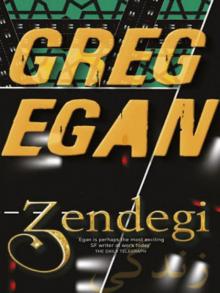 Zendegi
Zendegi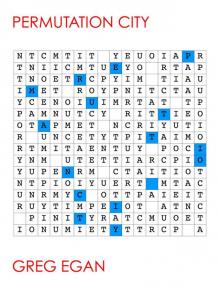 Permutation City
Permutation City The Eternal Flame
The Eternal Flame Artifacts
Artifacts Wang's Carpets
Wang's Carpets Dichronauts
Dichronauts Incandescence
Incandescence Teranesia
Teranesia Schild's Ladder
Schild's Ladder Quarantine
Quarantine The Four Thousand, the Eight Hundred
The Four Thousand, the Eight Hundred The Clockwork Rocket
The Clockwork Rocket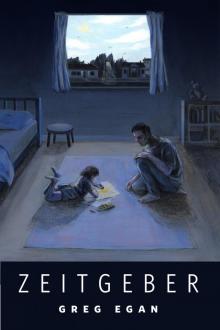 Zeitgeber
Zeitgeber Phoresis
Phoresis The Nearest
The Nearest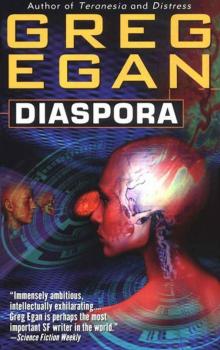 Diaspora
Diaspora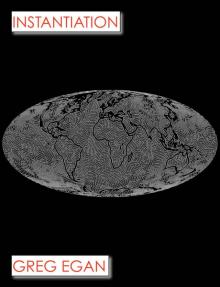 Instantiation
Instantiation Distress
Distress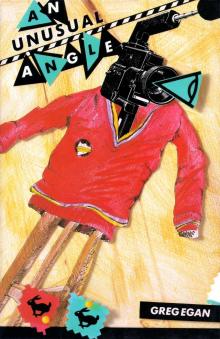 An Unusual Angle
An Unusual Angle Oceanic
Oceanic The Arrows of Time
The Arrows of Time Axiomatic
Axiomatic![Anthology 2. Luminous [1998, 2010] Read online](http://i1.bookreadfree.com/i/03/18/anthology_2_luminous_1998_2010_preview.jpg) Anthology 2. Luminous [1998, 2010]
Anthology 2. Luminous [1998, 2010] Perihelion Summer
Perihelion Summer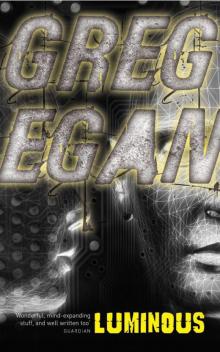 Luminous
Luminous